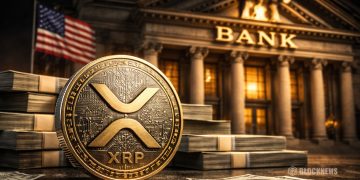- Crypto, a nonexistent asset for big institutional investors, says JPMorgan exec
- JPMorgan’s head of institutional portfolio strategy argues volatility of the asset class remains a challenge to money managers.
- Almost 43 million Americans (around 13% of the country’s total population) have owned crypto assets at some point in their lives.
JPMorgan head of institutional portfolio strategy Jared Gross has said that cryptocurrencies are a nonexistent asset for large institutional investors.
According to the asset management executive, big institutional investors are still skeptical and evasive of the crypto market citing the volatile nature characteristic of the asset class. Citing Gross:
“As an asset class, cryptocurrency is effectively nonexistent for most large institutional investors. The volatility is too high, and the lack of an intrinsic return that you can point to makes it very challenging.”
Gross also added that most institutional investors are relieved to have escaped last year’s tumultuous market crisis.
“Most institutional investors are breathing a sigh of relief that they did not jump into the market.”
Owing to the severity of the bear market, the notion that Bitcoin (BTC) could serve as an inflation hedge or as a form of digital gold was also put to a stop, with the likes of Gross claiming that it is “self-evident “that this is not the case.
BNY Mellon CEO Says Client Demand Is Critical
Contrary to what the JPMorgan exec has said, large financial institutions are increasingly embracing crypto. In October, the oldest American bank, BNY Mellon, announced it would safeguard Ether and Bitcoin for select institutional clients. Speaking to a news site, BNY Mellon CEO Robin Vince said that client demand is the tipping point for the introduction of institutional-focused cryptocurrency services.
The statement comes following a recent JPMorgan Chase Report suggesting that almost 43 million Americans (around 13% of the country’s total population) have owned crypto assets at some point in their lives. The number is a significant improvement from the 3% reported in 2020.
Besides BNY Mellon, France’s Société Générale bank also received regulatory approval as a digital assets service provider.
The past year was populated with several dramatic collapses within the cryptocurrency market. At the time of this writing, Bitcoin price is trading at $16,666 after losing 0.4% in the last 24 hours. The king crypto has fallen from the $47,700 high it recorded in January 2022, while Ethereum (ETH) plummetted from $3,700 to $1,200 in the same period. The total crypto market capitalization plummeted from $2.2 trillion to nearly $810 billion, according to CoinMarketCap.
JPMorgan’s DeFi Investment
In June 2022, JPMorgan hoped it had found a way for decentralized finance (DeFi) developers to leverage the yield-generating potential of non-crypto assets. In an interview at the Consensus 2022 in Austin, Texas, Tyrone Lobban, head of Onyx Digital Assets at JPMorgan, articulated the bank’s institutional-grade DeFi plans, highlighting how much value in tokenized assets is waiting in the wings.
“Over time, tokenizing U.S. Treasurys or money market fund shares, for example, means these could be used as collateral in DeFi pools. The overall goal is to bring these trillions of dollars of assets into DeFi so that we can use these new mechanisms for trading, borrowing [and] lending, but with the scale of institutional assets.”
Institutional DeFi typically entails establishing know-your-customer (KYC) strictures on the permissionless lending pools of cryptocurrencies, which had started happening in pockets of innovation like Aave Arc, and the project involving Siam Commercial Bank and Compound Treasury.
At the time, JPMorgan’s move to incorporate the tokenization of traditional assets pointed to a much larger scale, with Onyx Digital Assets seeing two complementary parts to implementing bank-grade DeFi.
Among them was JPMorgan’s blockchain-based collateral settlement system, which was extended in May 2022 to include tokenized versions of BlackRock’s money market fund shares. This was a form of the mutual fund invested in cash and highly liquid short-term debt instruments. That kind of application on the Onyx Digital Assets blockchain, which is settled in the bank’s in-house digital token JPM Coin, has had $350 billion in trading volume as of six months ago.
The second piece of the puzzle was a pilot spearheaded by the Monetary Authority of Singapore. It included JPMorgan, DBS Bank, and Marketnode and was christened “Project Guardian.”














